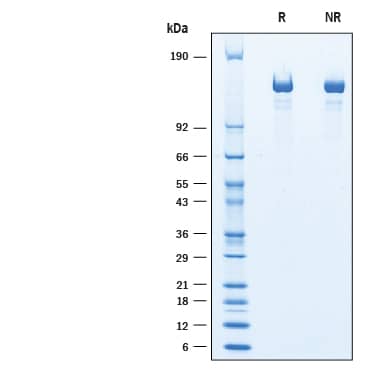Recombinant Mouse Caspr2 His-tag Protein, CF
R&D Systems, part of Bio-Techne | Catalog # 10196-CR

Key Product Details
Product Specifications
Source
Mouse myeloma cell line, NS0-derived mouse Caspr2 protein
Ala28-Ser1262, with a C-terminal 6-His tag
Ala28-Ser1262, with a C-terminal 6-His tag
Purity
>90%, by SDS-PAGE visualized with Silver Staining and quantitative densitometry by Coomassie® Blue Staining.
Endotoxin Level
<0.10 EU per 1 μg of the protein by the LAL method.
N-terminal Sequence Analysis
Ala28
Predicted Molecular Mass
138 kDa
SDS-PAGE
130-150 kDa, under reducing conditions
Activity
Measured by its binding ability in a functional ELISA.
When Recombinant Mouse Caspr2 His-tag (Catalog # 10196-CR) is immobilized at 0.5 μg/mL (100 μL/well), the concentration of Recombinant Human Contactin-1 Fc Chimera (Catalog # 904-CN) that produces 50% of the optimal binding response is 5-30 μg/mL.
When Recombinant Mouse Caspr2 His-tag (Catalog # 10196-CR) is immobilized at 0.5 μg/mL (100 μL/well), the concentration of Recombinant Human Contactin-1 Fc Chimera (Catalog # 904-CN) that produces 50% of the optimal binding response is 5-30 μg/mL.
Scientific Data Images for Recombinant Mouse Caspr2 His-tag Protein, CF
Recombinant Mouse Caspr2 His-tag Protein SDS-PAGE
2 μg/lane of Recombinant Mouse Caspr2 His-tag (Catalog # 10196-CR) was resolved with SDS-PAGE under reducing (R) and non-reducing (NR) conditions and visualized by Coomassie® blue staining, showing bands at 130-150 kDa.Formulation, Preparation and Storage
10196-CR
| Formulation | Lyophilized from a 0.2 μm filtered solution in PBS with Trehalose. |
| Reconstitution | Reconstitute at 500 μg/mL in PBS. |
| Shipping | The product is shipped at ambient temperature. Upon receipt, store it immediately at the temperature recommended below. |
| Stability & Storage | Use a manual defrost freezer and avoid repeated freeze-thaw cycles.
|
Background: Caspr2
References
- Gordon A. et al. (2014) J. Neurosci. 10:1523.
- Cope, E. et al. (2016) eNeuro. 0196-16.
- Peñagarikano O. et al. (2011) Cell. 147(1):236.
- Poliak, S. et al. (1999) Neuron 24:1037.
- Rubio-Marrero, E. N. et al. (2016) J. Bio. Chem. 291:5788.
Long Name
Contactin Associated Protein-like 2
Alternate Names
CDFE, CNTNAP2, NRXN4
Gene Symbol
CNTNAP2
UniProt
Additional Caspr2 Products
Product Documents for Recombinant Mouse Caspr2 His-tag Protein, CF
Product Specific Notices for Recombinant Mouse Caspr2 His-tag Protein, CF
For research use only
